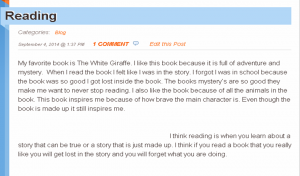Student Blogging: Benefits & Challenges
Week one in my 5th grade classroom is almost over, and I am exhausted, inspired, and excited! We started blogging the first day of school (yes,I actually tackled it on the first day – a half day!). It is Thursday night and I still have students who have not posted–the hiccups of technology and password issues, but we are getting there. When I sat down to read and respond to posts two hours ago, it crossed my brain that I must be crazy. Now, I am so glad that I made the decision to have my students blog. The prompts I gave my students were–tell me about your favorite book & why it’s your favorite and tell me “what is reading?”
The responses I’ve gotten have helped me to know my readers in ways I might not have otherwise for weeks. After one week, I know:
- what books resonate with them,
- where their thinking is in terms of what they believe reading is,
- who they are as writers from the voice (or lack thereof) in their posts;
- and what grammar lessons I should teach first and what skills are fairly solid.
Being able to respond quickly to each post allows me to connect with each student as well. All of this from one blog post per student! I resisted the urge to give corrections in my comments as I might have done in the past; I recognize that I need to connect and encourage at this point. I also did not make corrections to my students’ posts — I left the misspellings, even as I cringed while I read. I don’t want to shut down their writing process by giving criticism, even if it is constructive. These students don’t know me yet, and we need to establish a relationship of trust before they will be ready to receive this type of instruction. By forcing myself to ignore the grammatical errors, I find that I am intentionally looking for what my students do well as writers. This is a shift from our normal practice of evaluating what is wrong so we know what to teach (though I still do this with their pre-writes). With these blog posts, I am focusing on my students’ thinking, asking myself: how can I help them grow and develop as thinkers in addition to growing as readers and writers?
I am hopeful that by the end of the year, my students will look back at all their blog posts and be surprised and pleased by their growth. I am also hopeful that they will begin to correct their own errors because they are writing for a larger audience than just me: initially we share with our two 5th grade classrooms; then we will add in parents as audience members; finally, in March, we will participate in Two Writing Teachers Classroom Slice of Life challenge, which opens us up to a global audience.
There is a constant struggle for teachers these days to find balance between district mandated curriculum and expectations and making a professional decision because you know it is best for kids. Blogging these first days has been one of those decisions for me. My official workshop “launch” looks different this year with the inclusion of blogging. Some colleagues have questioned my choice. I am okay with this because what we have done with this blogging is so valuable and foundational for this school year. It is writing in a real-world context. My expectations are no different for blogging than they are in writing workshop. If anything, the bar is raised because my students have to employ what they have learned about digital literacy and internet safety. Still, I am sensitive to the criticism. I’m wondering how other teachers handle this type of conundrum? I’d love your feedback in the comments section below.
Where will we go from here? Honestly, I’m not sure yet. But I’ll keep you posted!
 Beth Rogers is a fifth grade teacher for Clarkston Community Schools, where she has been teaching full time since 2006. She is blessed to teach Language Arts and Social Studies for her class and her teaching partner’s class, while her partner teaches all of their math and science. This enables them to focus on their passions and do the best they can for kids. Beth was chosen as Teacher of the Year for 2013-2014 in her district. She earned a B.S. in Education at Kent State University and a Master’s in Educational Technology at Michigan State University.
Beth Rogers is a fifth grade teacher for Clarkston Community Schools, where she has been teaching full time since 2006. She is blessed to teach Language Arts and Social Studies for her class and her teaching partner’s class, while her partner teaches all of their math and science. This enables them to focus on their passions and do the best they can for kids. Beth was chosen as Teacher of the Year for 2013-2014 in her district. She earned a B.S. in Education at Kent State University and a Master’s in Educational Technology at Michigan State University.


